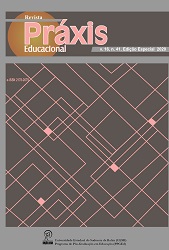THE EVERYDAY PRACTICES OF READING AND WRITING AS A CHILDHOOD`S RIGHT
DOI:
https://doi.org/10.22481/praxisedu.v16i41.7263Keywords:
Literacy, Everyday writing, ChildhoodAbstract
The relationship concerning childhood and literacy is still a fierce field of theoretical and methodological disputes in Brazil. In the midst of the reflections on childhood, the term literacy was banned from official speeches. This positioning has serious consequences as it reduces literacy to a strictly school task, located at a specific period in children's lives, and disregards literacy as a social communicational tool which children are progressively introduced to. In this text we present the interfaces between childhood, culture and writing activities to support that children are, at the same time, produced by the culture and also cultural producers, what includes the right to make use of the writing understood as a very important cultural heritage. In the sequence, we highlight domestic writing as a cultural aspect that children shall appropriate to take part in the family environment.and social life. From this perspective, we provoke a reflection on the writing situations that organize the functioning of the classroom and the school to defend the inclusion of everyday writing in school curricula, through an intentional and planned action that can legitimize them as a whole, as with other reading and writing practices. Finally, we reiterate the idea that the right to childhood includes the right to literacy, understood as entering the different cultures of writing.
Downloads
Metrics
Downloads
Published
How to Cite
Issue
Section
License

This work is licensed under a Creative Commons Attribution-ShareAlike 4.0 International License.
You are free to:
Share - copy and redistribute the material in any medium or format; Adapt - remix, transform, and build from the material for any purpose, even commercially. This license is acceptable for Free Cultural Works. The licensor cannot revoke these freedoms as long as you follow the terms of the license.
Under the following terms:
Attribution - You must appropriately give credit, provide a link to the license, and indicate if any changes have been made. You may do so in any reasonable way, but not in a way that suggests that you or your use is endorsed by the licensor.
There are no additional restrictions - You cannot apply legal terms or technological measures that legally restrict others to make any use permitted by the license.










